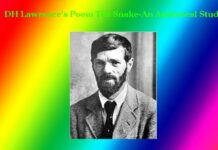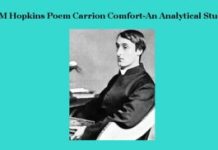Reformation or Puritan Elements in John Milton
Reformation or Puritan Elements in John Milton
Reformation or Puritan Elements in John Milton
‘Renaissance’ ‘Reformation’ and ‘Puritanism’ are the terms that have, though not synonymous, a close analogy and relationship among them. Because it was the ‘Renaissance’ that instigated the Reformation and it was Puritanism that set down the principles and goals of the Reformation. John Milton was a devout student as well as a scholar of the Renaissance spirit, but his mind was more inclined to Puritanism. In brief, Puritanism refers to the strict pursuit of the basic principles and tenets of the original Christian creed. In other words to say ‘Puritanism’ advocates and admonishes people to follow the original teachings of the Christian scripture and to consolidate the Hebraic or Biblical tenets in Christianity. The Reformation came out as a reaction against the corruption and disorder of the Church ministries. The main tenets of Puritanism were – obedience and faith in one and only God, belief in Christ as the Savior of Mankind, staunch belief in order and discipline, love of man, emphasis on morality, and belief in the victory of virtue over sin.
Of all the English Puritans, John Milton was the most devout and true. The elements or main tenets of Puritanism are immensely found in all his writings which have got blended with the elements of the Renaissance and Reformation. Now, let us find out the Puritan elements in his poetry.
Belief in one and only God: The Puritans were firm in belief in one and only God- in His supremacy, omnipotence, and omniscience. They condemned idolatry and believed God to be the root of all things. Milton was conscious of recording this creed in his Paradise Lost and wrote –
‘I may assert Eternal Providence
And justify the ways of God to man.’
Milton condemns the worship of animal images of the Egyptians in favour of one God-
‘With monstrous shapes and sorceries abused
Fanatic Egypt and her priests to seek
Their wandering gods disguised in burnished forms.’
The Puritans believed that the best prayer to God is to have absolute faith in Him. Milton reflects this faith as-
‘Henceforth I learn that to obey is best
And love with fear the only God.’
Belief in Christ as the Saviour of Man: John Milton, as a true Puritan believed in Christ who died for the redemption of mankind. The poet says:
‘Of Man’s first disobedience….
………………………….
Brought death unto the world and all over woe
With loss of Eden, till one greater Man
Restore us.’
Staunch Belief in Order and Discipline: The Puritans believed in orderliness and discipline in every sphere of life. Milton believed that through discipline, men could fulfill their passions and enjoyment, and obedience to God and his laws is the highest order. He says:
‘The law of God exact he shall fulfill
Both by obedience and by love through love
Alone fulfill the law.’
Emphasis on Morality and Moral Life: The Puritans emphasized on morality and moral teachings. They hated and revolted against all immorality and corruption. During the Middle Ages, the church in the name of religion did many misdeeds which were anti-religious. The Puritans were against immortality and the poet Milton abhorred it. He says that immoral life leads us to a state of misery. He writes:
Of all things transitory and vain, when sin
With vanity had filled the works of men.’
The poet himself also implores God to purge him, as-
Irradiate, there plant eyes, all must from hence
Purge and disperse…. .’
Love of Man (Humanism): Another factor of the Puritanical creed is love of man. The Puritans thought that men were the crown and root of all creations. Milton turned to the scripture for the best records of man’s nature in relation to God. For his love of man, Milton advocated natural as well as spiritual liberty, especially from the corruption of the churches, and supported individualism as a true Puritan reformer. He writes:
‘What might be public good myself I thought
Born to that end …’
Thus as discussed above, there are immense Puritanical elements in Milton’s poetry. Though the poet was a strict Puritan, he was much influenced by the spirit and blood of the Renaissance also. The elements of the Renaissance are stronger and more spacious in all his writings. Here to conclude that in Milton’s Paradise Lost, the elements of Renaissance, Reformation, and the spirit of Puritanism are blended so diffusely that all have undergone a chemical mixture. 0 0 0.
Reformation or Puritan Elements in John Milton
You May Like:
- ‘Poetry is the Criticism of LIfe’ Mathew Arnold-An Explanation
- Contributions of S T Coleridge to the History of Literary Theory and Criticism
Reformation or Puritan Elements in John Milton
N. B. The article ‘Reformation or Puritan Elements in John Milton’ originally belongs to the book entitled ‘Critical Essays on English Poetry‘ by Menonim Menonimus.
Reformation or Puritan Elements in John Milton
Books on Literary Criticism by M. Menonimus:
- World Short Story Criticism
- World Poetry Criticism
- World Drama Criticism
- World Novel Criticism
- World Essay Criticism
- Indian English Poetry Criticism
- Indian English Poets and Poetry Chief Features
- Emily Dickinson’s Poetry-A Thematic Study
- Walt Whitman’s Poetry-A Thematic Study
- Critical Essays on English Poetry
- Tawfiq al-Hakim’s Novel: Return of the Spirit-An Analytical Study
- Tawfiq al-Hakim’s Novel: ‘Yawmiyyat Naib Fil Arayaf’-An Analytical Study
- Analytical Studies of Some Arabic Short Stories
- A Brief History of Arabic Literature: Pre-Islamic Period (500 AD-622 AD)
- A Brief History of Arabic Literature: Early Islamic Period (622 AD-661 AD) …
Related Search:
- Paradise Lost: Blending of Reformation and Renaissance
- Puritan and Classical Elements in Milton











